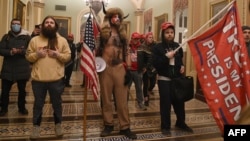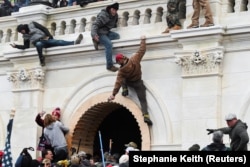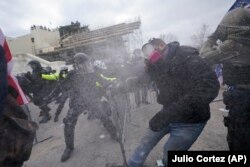With four individuals dead and multiple police wounded, Russian analysts interviewed by Current Time believe that the January 6, 2021 seizure of the U.S. Capitol by radical supporters of U.S. President Donald Trump could have long-term consequences for the United States’ reputation as a “beacon of democracy,” even after the country’s immediate political crisis is resolved.
After witnessing the fracas firsthand, political analyst Maria Snegovaya, a fellow at the Atlantic Council’s Eurasia Center in Washington, D.C., termed the storming of the Capitol building a failed “coup attempt” that “will cause significant damage to the [election] procedure in the U.S., democracy, and the image of the U.S. in the world.”
The violence interrupted Congress’ certification of electoral votes from the 2020 presidential election that would declare Democratic Party candidate Joseph Biden the winner. Initially evacuated, members of Congress later reconvened and, over the objections of some Republicans, declared Biden president on January 7.
But the earlier chaotic scenes of a mob overcoming police to traipse through the Capitol already had offered a messaging opportunity for media outlets tied to the Kremlin. Russian President Vladimir Putin and his administration long have blamed the U.S. for street uprisings over elections throughout Eurasia that have led to changes of power in Georgia, Kyrgyzstan, and Ukraine.
“[The] US gets the kind of ‘democracy’ it championed overseas,” read a January 6 op-ed headline promoted on the home page of RT, a TV-digital operation formerly known as Russia Today. In a separate RT op-ed, former U.S. weapons inspector Scott Ritter, a critic of U.S. foreign policy, declared that the turmoil was “a symptom of a bigger disease infecting our democracy.”
Remarks by prominent U.S. public figures also fed into this messaging.
The news outlet Sputnik zeroed in on former U.S. President George W. Bush’s observation that “This is how election results are disputed in a banana republic - not our democratic republic.”
On Facebook, Russian Foreign Ministry spokeswoman Maria Zakharova reposted a comment by former CNN foreign-affairs correspondent Jill Dougherty, a Russia specialist at the non-partisan Wilson Center think tank, that “The United States will never again be able to tell the world that we are the paragon of democracy.”
President Putin himself has not yet commented directly on the Capitol attack. January 7 marks the Orthodox Christian celebration of Christmas, an official holiday throughout much of Eurasia, including Russia.
Putin’s close ally, Alyaksandr Lukashenka of Belarus, however, cited the fatalities during the Capitol takeover as another reason why Belarusian protesters, who, for nearly five months, have rejected his official reelection as president, should disperse. Belarus “needs to get together, to calm down,” Lukashenka said, Russia’s state-run TASS news agency reported.
Though she did not address any parallels with Belarus, Aleksandra Filippova, a researcher at the Russian Academy of Sciences’ Institute for U.S. and Canadian Studies, sees the risk of a deep schism in U.S. society – a concept not difficult for those who have experienced Eurasia’s violent political struggles to accept.
The pro-Trump mob, Filippova continued, represents not only those who oppose Biden’s election, but those who oppose the Republican Party and its “establishment.” Without another potential Republican leader, the creation of a “party of Donald Trump” now has become “completely possible,” she forecast.
“[T]he situation now really causes concern,” Filippova added.
Andrei Korobkov, a Russia-born professor of political science and international relations at Middle Tennessee State University, questioned how Biden can truly prove a president “for all Americans” after terming the riot participants “a small number of extremists dedicated to lawlessness.”
“In general, this is a very dangerous moment that, of course, strikes primarily at
the legitimacy of the political system itself,” Korobkov said.
The storming of the Capitol reminded Korobkov of “a color revolution;” a term often used in Eurasia for the 2003-2005 popular uprisings against election fraud that led to changes of government in Georgia, Kyrgyzstan, and Ukraine.
As in these three cases, he alleged that the U.S. political elite is reluctant to come to terms with the opinions of “at least part” of U.S. society, and noted the presence of a “charismatic leader” – an apparent reference to U.S. President Donald Trump – who refuses to be denied power.
Tweeting that the photos from the Capitol were “[q]uite Maidan-style,” Russia’s deputy UN ambassador, Dmitry Polyansky, drew a similar comparison.
Rather than color revolutions, U.S. courts' rejections of President Trump’s 62 complaints about the November 2020 presidential election’s conduct and results stood out for one other Russian commentator.
“Russian courts never dared to do anything like this" and defy the Kremlin, noted Sergei Parkhomenko, a veteran journalist and civil-society activist, who spoke from Moscow.
By comparison, the U.S. courts were “extremely principled” in handling Trump’s complaints, insisting on the need for evidence, and “not lazy about writing huge, multi-page” opinions to explain the courts’ rulings against the U.S. leader, Parkhomenko commented.
Like Korobkov and Filippova, however, Parkhomenko also saw cause for long-term repercussions for the attack on Congress. For many U.S. citizens, he noted, the institution ranks as “the heart of America” and “the brain of America.” *
One analyst from a Kremlin-friendly think tank, however, predicted that the short-lived Capitol takeover likely spells the end of organized protests against Biden’s election. Most of U.S. society, including Trump himself, now realizes that a red line has been crossed, Fyodor Lukyanov, research director of the Valdai Discussion Club, commented to TASS.
Perhaps mindful of the Russian government’s own violent crackdowns on recent political protests, Lukyanov predicted that a “harsh use of force” will be used against any other organized attempts to challenge Biden’s election.
Snegovaya, however, believes that Trump himself, who encouraged his supporters to march on the Capitol during the certification of the Electoral College vote, will ultimately be held responsible for the turmoil.
At least one of the four people killed during the takeover attempt died from gunfire from the U.S. Capitol police, who protect Congress. The remaining three died from “medical emergencies,” according to the Washington, D.C. police.
Some 14 people from the city’s police force were injured by Trump supporters during the takeover attempt. Scores of people were detained.
Yet both President Trump and President-Elect Biden have emphasized the need for peace. On January 7, President Trump, now facing calls for his removal from power, pledged an “orderly transition” to a Biden administration.
Washington, D.C. will be under a state of emergency until January 21, the day after the inauguration of President-Elect Biden and Vice President-Elect Kamala Harris. Hundreds of National Guard troops, from the District of Columbia and the neighboring states of Maryland and Virginia, already have been mobilized in the U.S. capital.
*Current Time is funded by Radio Free Europe/Radio Liberty, which is financed through annual congressional allocations to the U.S. Agency for Global Media.







